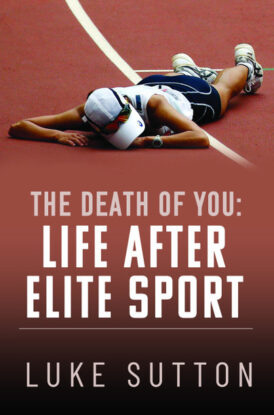The Death of You: Life After Elite Sport
Martin Chandler |Published: 2023
Pages: 169
Author: Sutton, Luke
Publisher: White Owl
Rating: 3.5 stars

Luke Sutton kept wicket professionally for three counties. He began at Somerset as Rob Turner’s understudy before spending more than a decade as first choice at Derbyshire and Lancashire. In 2019 he wrote a revealing autobiography that laid bear struggles with mental health and alcohol, and he has also written a book on his specialist subject, wicketkeeping.
Now a successful sports agent Sutton has also written a book on that subject, and now we have his fourth venture into publishing as he draws on something of each of his previous books to turn to the related subject of the end of a career in top level sport. The title looks, at first glance, a little over dramatic, but this is not a book about the end of life, rather about an end to a chapter of life.
There is a nod in Sutton’s narrative to his own retirement but, essentially, he seeks to make his point by looking at the experiences of six other sportspeople, all of whom were willing participants in his project.
The book begins with a cricketer, England’s bowling metronome from the mid noughties, Matthew Hoggard. The Yorkshireman had a difficult transition to life after cricket, although he has now established a successful food business.
The oldest of the six is former footballer Paul Walsh. I remember Walsh well from his days at Liverpool and Spurs. He was a gifted striker who would doubtless have achieved more than five England caps were it not for issues with alcohol. Walsh’s career was ended by injury at 34.
Then there is badminton player Gail Emms, who won a silver medal at the 2004 Olympics. Her experience, in a minority sport that brought little by way of adulation until that Olympic breakthrough, was very different to the others featured. For her retirement was a challenge that no one helped her to prepare for.
Rugby Union player Tom May had a long career. He was fortunate to remain largely injury free and, unlike others, also did much to prepare for the retirement he knew would inevitably come. Despite that he struggled to adapt his attitudes from the camaraderie of the sport he graced for the best part of two decades to the much more selfish world of business.
And then there is Johnny Nelson, a man whose story Sutton describes as unique. A World Champion cruiserweight boxer like Walsh injury ended Nelson’s career. He had done little to prepare himself for his life after boxing, although he has become a successful broadcaster.
Bringing up the rear is the youngest of the six, Irish footballer Clare Shine. Now 28 Clare retired at 27 through choice, so the story there is not yet what she has moved on to, but why she felt she had to retire.
A cynic would doubtless say that, as an agent, Sutton has a vested interest in the subject of retirement,and that may well so. But it is equally clear that it is a subject that fascinates him as much as the lack of support for sportsmen and women coming to the end of their careers disappoints him.
Retirement is seldom an entirely comfortable prospect, and it has to be faced much earlier by professional sportspeople than the rest of us, but that factor apart I have to say that I am not sure it is so very different. As a man who has wrestled with this very problem for a few years now I was able to identify with enough of what Sutton writes to understand exactly where he is coming from, and particularly to appreciate that I am fortunate that for me the choice is mine even if, somewhat perversely, the decision I appear to have made by default is to wait until I am pushed.
Luke Sutton’s fourth book is as thought provoking as the previous two that I have read, and a reminder that I really should seek out a copy of The Life of a Sports Agent, if only because that is one of the few occupations I might fancy having some sort of tilt at, in the seemingly unlikely event that I ever do choose to retire.







A good cricketer and a good man. I have just about forgiven him for dropping a catch from my bowling (standing up) just over twenty years ago. The drop enormously amused the first slip fieldsman, Jimmy Ormond. Why was I on the same field as Sutton and Ormond? I can’t recall, but it happened!
Comment by Max Bonnell | 9:39am GMT 26 November 2023